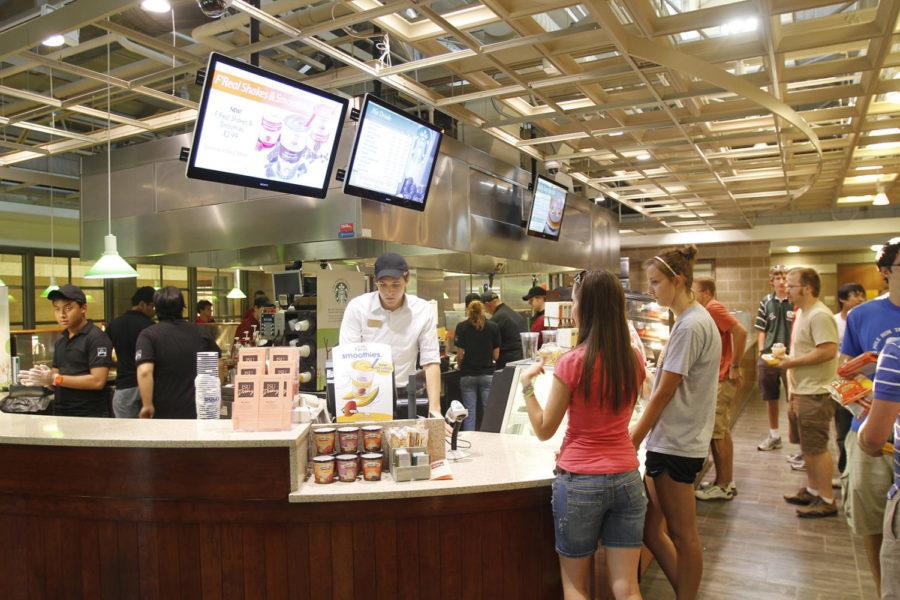Despite debts, Department of Residence makes strides in renovating living, dining facilities
Photo: Kait McKinney/Iowa State Daily
Students flock to Hawthorn Cafe at Frederickson Court to try out the new options the dining center has just implemented.
March 19, 2012
In having to generate its own revenue, the Department of Residence has found itself with a current outstanding debt of $95.855 million.
Money has been borrowed to enhance on-campus student living through projects that include renovating Maple Hall, Conversations Dining Center and Buchanan Hall. It has also gone to constructing Frederiksen Court, Hawthorn Market and Cafe, Union Drive Marketplace and Community Center, Martin Hall, Eaton Hall and Seasons Marketplace.
Combining the outstanding principle and interest together for an amount due of $165,797,458, many people think the department is suffering under a large amount of debt to pay back.
However, Peter Englin, director of the Department of Residence feels the department is in a strong financial position that has allowed it to further expand housing and dining capacities to help provide students with more opportunities on campus.
“We are in a financially healthy situation, though we have many opportunities to accelerate facility improvements as additional funding is available,” Englin said. “Three great examples would be improving food stores’ efficiencies, renovating restrooms and replacing windows. We’re making progress, but it could always be faster.”
Jacob Swanson, junior in public service and administration in agriculture, feels students should understand the bonding system and loans the Department of Residence is allowed to take out so it can make changes for students.
“The fact that we are in this much debt is not unusual and is not a bad thing,” Swanson said. “The revenue of the DOR comes from people that live in on-campus housing.”
After the money that is provided from students’ housing fees for living university-owned buildings, the Department of Residence also is allowed to use long-term bonds to help improve student life and can pay them back over a significant amount of time.
Englin believes there is an indication that the Department of Residence at Iowa State has continued to meet its own expectations as more students attend the university.
“The Department of Residence and ISU Dining are auxiliary enterprises. We do not receive general fund [tax] dollars to operate and must generate our own revenue. We also do not generate profit in the sense of the private sector,” Englin said. “Any revenue we generate beyond annual operating expenses is reinvested back into the dining facilities and program, residence halls and apartments to enhance the student experience. “
In continuing to provide different styles of living through traditional space, suite style and newer and older apartments, the Department of Residence intentionally hopes to provide different experiences and price points so students can take away the experience they wish while living on campus.
If students wish to receive more information about how money is spent, used or contributes to providing for Iowa State, they are encouraged to speak with on-campus student leaders from members of the Inter-Residence Hall Association, Frederiksen Court Council or Schilleter-University Village residents. The financial information and facility improvement plans are shared with these students.
IRHA and the Financial Counseling Clinic approve the proposals made to where the money from the Department of Residence should be spent. They then help with the financial decisions that can best serve students with resources that will make their college experience the best it can be.

















